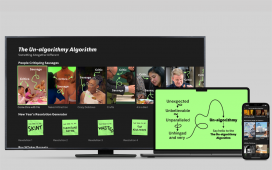When Facebook first launched as a college-based social network 20 years ago this week, there was little indication that it would become what it is today. The company, now rebranded as Meta, controls the critical infrastructure of our information and communications systems and access to the public sphere, and is central to the digital economy.
Who would have predicted that a company that started as a way to connect college students would be blamed for deteriorating mental health, genocidal violence and the rise of anti-democratic populism around the world?
Yet here we are.
Over the past decade, the company’s social media and messaging channels have been linked to deterioration in self-esteem and mental health, including increases in anxiety, depression and addiction. They have been shown to foster feelings of envy and jealousy, contribute to eating disorders and body image issues, impinge on sleep and enable cyberbullying.
The company’s platforms have been used to fuel the spread of terrorism and violent extremism, mass violence and online harassment. Meta’s core products – Facebook, Messenger, Instagram and WhatsApp – enable human trafficking, drug trafficking and the illegal wildlife trade, along with the proliferation of child sexual abuse material and child exploitation. People use Meta’s social media and messaging platforms to spread propaganda, disinformation and information warfare, undermining the integrity of our information ecosystems and elections around the world.
Nearly 4 billion people regularly use Meta’s core products, making the tech giant one of the most powerful companies across a range of sectors, from data gathering and processing to digital advertising and publishing. Meta controls access to the internet in many countries, and determines viability and profitability for content creators, businesses and politicians around the world.
Meta has fundamentally reshaped our political economy through its influence over the public sphere, contributing to widespread democratic deterioration and the rise of demagogic populism and digital authoritarianism.
Businesses of all types rely on access to the data, audiences and digital advertising that Meta controls, alongside Google, while political campaigns, publishers and content creators rely on the same infrastructure. As we enter the age of AI, Meta will control access to critical components of AI’s underlying infrastructure, from vast data and computational resources to scarce chips and cloud services.
How did we get to this point?
It was not inevitable.
Rather, a combination of tech exceptionalism, brazen defiance and lots and lots of money have enabled Mark Zuckerberg’s company to accumulate vast market power over the two decades of its existence amid sclerotic antitrust oversight and “repeated and deliberate policy failures,” in the words of Daniel A Hanley of the Open Markets Institute.
Over the past two decades, Meta and its ilk have enjoyed unprecedented exemptions from libel law and intermediary liability, anti-discrimination and product safety requirements, privacy and intellectual property constraints, and restraints on competition. Meta has not been held responsible in any meaningful way. Fines are just a cost of doing business, and efforts to subvert oversight and regulation have allowed the company and its founder to continue to operate with impunity and immense profitability.
Since its founding, Facebook has acquired more than 60 companies, with none of those acquisitions stopped by regulators, and is now poised to control core AI infrastructure, from supercomputers to foundation models on which other companies rely to run their own applications.
In the absence of federal privacy legislation, public interest data governance and meaningful antitrust enforcement, Meta, along with Google, was able to create a new economic order built on the parasitic logic of surveillance and behavior modification in what technologist Shoshana Zuboff has aptly dubbed surveillance capitalism.
We did not vote for or acquiesce to this system. It was foisted upon us by Zuckerberg’s “move fast and break things” ethos and the failure to prevent the vast consolidation of power in a handful of Big Tech firms, whose insatiable quest for “permissionless innovation” has come at great cost. Now generative AI is posed to upend labor markets and democratic institutions around the world.
If the past 20 years have taught us anything about this one-time upstart turned tech titan, it is that Meta and Zuckerberg must not be allowed to unilaterally shape the next era of humanity. As the tech world celebrates this milestone, it is time to demand accountability for the harms propagated by powerful tech companies such as Meta and break up the tech behemoth before it wreaks further havoc on individuals, society and the economy. Dismantling Meta’s digital legacy is imperative if we want to wrest back control and save democracy.












